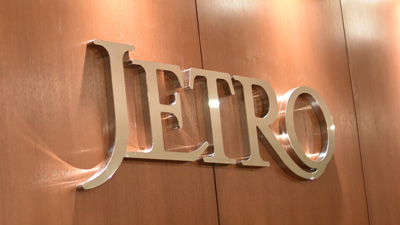Success StoriesWise Systems
Doing Good, Doing Well|Bringing Smiles to Logistics Businesses
Today’s society confronts many problems, including climate change, energy issues and a growing elderly population. Companies around the world are tackling fresh challenges in efforts to solve these problems.
In this Doing Good, Doing Well episode, we interview forerunners at foreign-affiliated companies that have established bases in Japan and are working on solutions.
Our guest on this episode is Mr. Keiichiro Araihara, Country Manager of Wise Systems Japan, which is the Japanese affiliate of Wise Systems, a US-based startup. Wise Systems offers a delivery route automation solution, also called Wise Systems, which uses AI technology to create optimal delivery plans and capture real-time situations for the logistics industry.
What positive change is Wise Systems Japan’s business making on the way drivers work? We chatted with Keiichiro about the transport industry’s unique problems, his experiences setting up a company in Japan and the fruits of his labors so far.
Guest: Keiichiro Araihara, Wise Systems Japan
Host: Ayaka Kadotani
Narrators: Cyrus Nozomu Sethna (intro and outro), H.C. (interview)
Recorded: December 20, 2022

- Establishment
- 2021
- Destination
- Tokyo・Kanto
- ICT
-
USA
Update : 2023/03
Listen to podcast
Listen here
Transcript
Narrator: Doing Good, Doing Well is a series of podcasts from the Japan External Trade Organization or JETRO, targeting businesspeople interested in investing in or considering expanding into Japan. JETRO is a governmental organization promoting investment in Japan and business partnerships between Japan and the world.
Today’s society confronts a wide range of problems, including climate change, energy issues and aging populations. Companies and organizations around the world are tackling fresh challenges in an effort to solve these problems.
In this series, we bring you interviews with forerunners at foreign-affiliated companies that have established bases in Japan and are working on solutions.
Today’s theme is Bringing smiles to logistics businesses.
A startup company has arrived from the United States, determined to advance Digital Transformation in the transportation industry.
What challenge is Wise Systems Japan tackling to create a better future? Let’s find out.
Ayaka Kadotani: Hello, everyone! I'm your navigator, Ayaka Kadotani. Today, I have the pleasure of speaking with Keiichiro Araihara, Country Manager for Wise Systems Japan, which was founded in January 2021. We’re going to talk about how Wise Systems is revolutionizing the shipping industry and how it entered the Japanese market. Thank you for joining us, Kei.
Keiichiro Araihara: Nice to meet you.
Ayaka: So, first, can you quickly talk about what Wise Systems’ business is all about? Please describe your operations and corporate philosophy.
Keiichiro: Wise Systems, which spun out of MIT (Massachusetts Institute of Technology) Media Lab in 2014, was founded with the purpose of using data to transform the distribution of goods and services. As the volume of deliveries explodes with the impact of the COVID-19 pandemic and the expansion of online shopping, the delivery experience until the arrival of goods is becoming very important. In the U.S., where our headquarters is located, packages frequently fail to arrive on schedule, but people used to live with that. In recent years, however, that perception has been changing dramatically, and customers are demanding increasingly higher quality from deliveries. Under these circumstances, the transportation industry is facing various problems, such as manual delivery routing, shortage of drivers, and the time required for new drivers to get accustomed to delivery routes. Wise Systems is a delivery route automation solution that uses AI technology to create optimal delivery plans and capture real-time situations.
Ayaka: Right. That was quite a comprehensive description of your company. Thank you for introducing. Now, let's dive a bit deeper. What does Wise Systems offer that we don’t see in other companies?
Keiichiro: For the transportation industry, the most important thing when delivering packages to customers is which route is most efficient and ensures reliable delivery. The delivery time consists of two main parts: first is the driving time to the customer's place, and the second is the time to park the car, take out the package and bring it to the customer. Wise Systems focuses on the delivery process’s second "non-driving" part. For example, the driver must wait for another truck in front of the line to finish unloading, or the cargo volume is large and takes time to complete the delivery. These processes could take up to 30 minutes or an hour. Our system learns what happened after the car was parked, how long it took, the impact of the number and size of packages, and many other factors. It allows us to improve the accuracy of the following delivery and reasonably design the driver's daily schedule. That is our strength.
Ayaka: That sounds like a pretty innovating solution, and thank you for sharing so many of the behind-the-scenes efforts. So, what sorts of social issues related to the transportation industry can we solve by introducing Wise Systems solutions?
Keiichiro: The transportation industry is facing operational efficiency issues due to driver shortages, deteriorating working conditions for the driver, increasing vehicle mileage and CO2 emissions, and delays in digital transformation. We are also facing the last one-mile delivery issue. First of all, not so many people want to become a driver. In this regard, most drivers are male in their 40s to 60s or older. And there is a concern about a future shortage of human resources if the older people retire without young professionals in their 20s to replace them. If the current situation continues, this generation gap will make it difficult to pass on the know-how and skills of delivery to the youth. Assuming that the number of young or female drivers will increase in the future, it is necessary to create a system to familiarize them with the delivery business. Wise Systems' solutions, which one can use with a web browser and a smartphone, can help not only drivers new to the transportation industry, but also dispatchers and operation managers overcome the various barriers they face.
Ayaka: Right. It's pretty interesting how you're going to solve the human resources issues that currently exist in the transportation industry. Would you tell us a bit more about some of the other issues that you have right now, such as the CO2 reduction and digital transformation?
Keiichiro: Administrators spend a lot of time, such as manually preparing transportation plans and responding to unexpected incidents on site. Before, telephone calls were the only way to obtain real-time information on the driver’s location, how many deliveries had been completed and how many more to go, and what the driver would do next. Digitalization enables this information to be managed centrally on a computer, significantly improving business efficiency. Also, repeated re-delivery leads to higher vehicle fuel consumption, which increases costs. At the same time, there is an urgent need to reduce CO2 emissions. Of course, reducing travel distance during delivery can decrease vehicle fuel consumption and thus contribute to cutting CO2 emissions. As an example, with our system, our U.S. customer has reduced delivery delays by 80% and travel distance by 15%, thus decreasing CO2 emissions. We have also seen cases such as a 20% improvement in truck usage efficiency.
Ayaka: Wow, I'm so impressed. It seems like you can actually solve a lot of issues that we have currently in the society, if you use the service. It's amazing. Thank you for sharing that. Now, I was also wondering why Wide Systems decided to enter the Japanese market in 2021. What were some of the reasons that led to that decision?
Keiichiro: When considering business expansion in the world, including Asia, the U.S. headquarters thought of growth and success in Japan as a significant milestone to achieve. The company chose Japan as a destination because of the high-quality standards and sensitivity required for products and services in Japan, which would provide an opportunity for further refinement and growth of our services. Another key factor was our decision to partner with Mitsubishi Fuso Truck and Bus Corporation, which is part of Daimler Trucks. Currently, Mitsubishi Fuso Truck and Bus is in charge of our marketing and sales activities in Japan, as well as the initial stages of customer support.
Ayaka: I see, so you took business in Japan as an opportunity for growth. That's pretty interesting. Thank you. Now, I 'd like to ask you about you personally. What events led to your involvement in Wise Systems’ entry into Japan?
Keiichiro: Delivery drivers who delivered my online purchases to my home always looked as if they were tired and somehow pressed for time. I was interested in Wise Systems because I felt that their system could change drivers’ working environment and make them work with a smile. Wise Systems is a "doctor for people in the transportation industry." We want to know what your problems are, what we can do to solve them, and what we can do to help you regain your health. We want everyone to enjoy working with smiling faces. It will also allow companies to make profits without strain and use them for investment in new things. The transportation industry is the backbone of Japanese business. If it can become healthy and competitive, not only companies but also Japan's entire society will be able to move forward in a sustainable direction.
Ayaka: Yes, definitely, sustainability is one thing we all need think about right now. But I really love how much you value making people happy. So, thank you for sharing that. Now, what were some of the challenges that you faced when establishing the base of operations in Japan?
Keiichiro: I could say that everything was a challenge. For example, when you try to open an account with a Japanese bank, the bank will spend a lot of time examining how to evaluate your company. Furthermore, a company cannot be run by salespeople and engineers alone; there are many less visible things, such as social insurance and bookkeeping. It took us many work hours just to figure out what needed to be done, including the differences between Japan and the United States, and to deal with them. Nevertheless, when I was appointed the representative of the Japanese subsidiary, corporate registration, opening a bank account and other things had already been completed together with a labor and social security attorney. I believe this is a testament to the great service and support we received from JETRO's incorporation consulting service. Now, in addition to myself, we have more engineers, but hiring them was not without difficulties. From the applicant’s perspective, they would think twice before applying for a position at a newly established company in Japan that had only begun to build a business track record. However, if you look at this situation and think that "I am going to create the structure and achievements from scratch," it may have been the best environment for you.
Ayaka: Right. It seems like you're really welcoming all the challenges and you're enjoying yourselves. Pretty exciting, thank you. Now it’s been about a year and a half since you set up your shop here. What kinds of responses and reactions have you had in developing Wise Systems in Japan? And what have you noticed in particular?
Keiichiro: There is still room for innovation in the Japanese transportation industry by promoting digitalization. Many people are already using computers, but only for creating documents in Excel, and they are facing challenges, especially in terms of improving the dispatchers’ efficiency of delivery route planning. With its ability to manage everything digitally and centrally, Wise Systems could solve this problem. Still, people who introduce the system are concerned about whether they will be able to handle it themselves. For these reasons, our business has yet to be smooth sailing. We need to be patient now. The key to success in Japan will be whether we can attract customers who feel digitalization is necessary and convert them to adopt the Wise Systems. From the standpoint of CSR (Corporate Social Responsibility), companies that use vehicles need to take measures against global warming, such as considering the introduction of EVs and introducing systems to improve the efficiency of vehicle use. To this end, we would like to promote our systems in cooperation with Mitsubishi Fuso Truck and Bus Corporation.
Ayaka: Right. Fantastic. Do you have any other commitments for the future?
Keiichiro: Software localization is also important. If you just bring the software from abroad as it is, it will not likely work. We need to consider not only Japanese language translation but also the road conditions unique to Japan. For example, in Japan, people drive in the left lane, but in other countries such as the U.S., they usually drive in the right lane. In Japan, we want to avoid making trucks turn right because of the increased waiting time at traffic lights and the risk of hitting pedestrians. In Europe and the U.S., this is exactly the opposite. Moreover, a unique delivery method, such as reloading cargo before heading for the next delivery, is standard in Japan. There are also other differences in the width of the road and vehicle. It is necessary to understand these differences in planning the delivery route.
Ayaka: Right. Of course. In any situation, I guess, you need to really think about the differences of culture and traditions. It's great that you're already working on it. So, finally, do you have any advice for other companies who are considering to expand their businesses in Japan?
Keiichiro: First of all, it is better to understand the differences in market conditions, commercial trends, and customers’ ways of thinking. For this purpose, finding a business partner, such as Mitsubishi Fuso Truck and Bus Corporation for us, who can serve as a good advisor is crucial. It is important to talk openly with an organization like JETRO, which has a network and support function. We were fortunate to have a business partner, Mitsubishi Fuso Truck and Bus Corporation. We feel very privileged to be able to combine our technology with their knowledge of the automotive industry.
Ayaka: Great advice. So, understand the market and have great business partners, and just generally, someone to talk to. Great advice, thank you. All right, so, that takes us to the end of the show. Thank you for joining us today, Kei.
Keiichiro: Thank you very much.
Narrator: Wise Systems Japan is brightening the future of the transportation industry. What did you think of the story of its entry into Japan?
We hope today’s episode provided you with some inspiration on how to seize the business opportunities available in Japan.
To learn more detailed information on entering the Japanese market or collaborating with Japanese companies, be sure to visit the JETRO website and our social media pages on Facebook, LinkedIn, and Twitter.
In future installments of Doing Good, Doing Well, we’ll continue to bring you interviews with key people in a wide variety of companies. Thank you for listening and see you in our next episode!
Related Industry
Explore More
-

Success Stories
Success Stories are based on interviews conducted with foreign companies and foreign-affiliated companies that have successfully come into the Japanese market.
-

JETRO’s Support
We provide consistent one-stop service for establishing a base or expanding business in Japan.
-

Setting up Business
You can find information on overall and detailed steps, cost estimation, an overview of the laws, regulations and procedures related to setting up business, and more.
Contact Us
Investing in Japan
We will do our very best to support your business expansion into and within Japan. Please feel free to contact us via the form below for any inquiries.
Inquiry FormJETRO Worldwide
Our network covers over 50 countries worldwide. You can contact us at one of our local offices near you for consultation.
Worldwide Offices

























